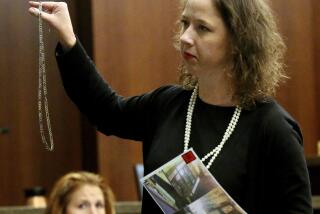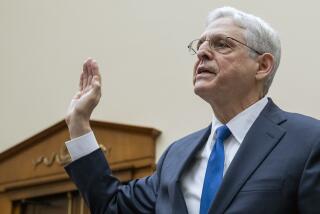Prosecutor in Hutton Case Defends Actions
- Share via
WASHINGTON — Flamboyantly, spiritedly and, for some lawmakers, convincingly, the lead prosecutor in the E. F. Hutton check-kiting case denied Friday that there was any political motivation by the Reagan Administration to withhold criminal charges against Hutton officials.
“I was in control of the case from day one until right now,” Albert R. Murray Jr., an assistant U.S. attorney in Harrisburg, Pa., declared at a hearing before the House Judiciary subcommittee on crime.
Murray said he made the decision not to seek indictments of individuals and instead allow the giant brokerage firm simply to plead guilty to 2,000 criminal counts of fraud last May and pay a $2-million fine and another $750,000 in costs.
“Nobody pressures me, tells me what to do or to give up my morals,” said Murray, who delivered his opening statement standing up, as if addressing a jury, and held his audience rapt with a virtuoso display of freewheeling patter and arcane expertise.
Denies Any Pressure
He contended that not even subtle pressure was applied by Justice Department higher-ups--one of whom, Asst. Atty. Gen. Stephen S. Trott, sat next to him at the hearing into the department’s handling of the case.
Drawing laughter, Murray said the only ones who push him around are “God above or my dad back there.” His father, a New York city criminal court judge, was seated in the hearing room.
Though most of the panel’s Democrats remained skeptical, the Republicans and Democratic Rep. Romano L. Mazzoli of Kentucky clearly bought Murray’s explanation of events.
“It’s very clear to me you were a young David who went after a Goliath and got him. It was judgment well exercised,” said Rep. E. Clay Shaw Jr. (R-Fla.).
Murray, who originally considered seeking indictments against at least a pair of low-level Hutton executives, said he eventually had to “fight and scratch” to persuade Trott, who is in charge of the Justice Department’s criminal division, not to seek any indictments.
He asserted that reaching the out-of-court settlement with Hutton was the only way to accomplish desperately needed reforms in a banking system that was threatened with chaos because of widespread check-kiting practiced not only by Hutton but by many other corporations.
Industry Practice
Moreover, Murray said he had determined that, if he brought charges against anyone at Hutton, he would have to prosecute practically everyone.
“All 17,000 (employes) were . . . following industry practice,” he said. “When that industry sets a standard that becomes fraudulent, it’s hard to tell” if any single person is culpable.
Subcommittee Chairman William J. Hughes (D-N.J.) pressed Murray hard on a decision that was made in November, 1984, to extend the term of a grand jury even though Murray appeared ready to move with indictments.
The extension was sought shortly after Hutton Chairman Robert Foman requested it at a luncheon with then-Atty. Gen. William French Smith.
Murray contended that the decision to extend the grand jury was made because he needed more time to develop the case.
Hughes told Murray that his integrity was “beyond dispute” but that he disagreed with the decision not to indict individuals.
More to Read
Get the L.A. Times Politics newsletter
Deeply reported insights into legislation, politics and policy from Sacramento, Washington and beyond. In your inbox twice per week.
You may occasionally receive promotional content from the Los Angeles Times.










